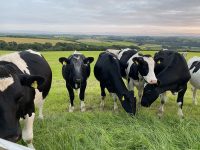COVID-19: Practical guidance for our rural and farming clients #22
This week in our rural update;
- the Self-Employment Income Support Scheme has opened for the second round of funding
- new guidance on what it means when HMRC say ‘adversely affected’
- a reminder of the Small Business Grant Fund and the Retail, Hospitality & Leisure Grant Fund schemes
- the procedure for any claim errors on the Coronavirus Job Retention Scheme
- an update on child tax credit.
We also give you the opportunity to watch back our Financial Planning guide for farmers, where Rural Financial Planner, Stuart Coombe discusses strategies and checklists for farmers to make the most of their personal finances.
If you have any questions about any of the below please do get in touch with your adviser in the first instance, or alternatively click here…

26th August 2020
-
Andrew Vickery See profile
As we mentioned last week the second and final income support scheme for the self-employed (and for members of a partnership) is now open. As with the first round of the SEISS many in the agricultural industry could be eligible to claim. You must however apply on or before 19 October 2020.
When you make this claim, you will have to confirm to HMRC that your business has been adversely affected by COVID-19 on or after 14 July 2020.
As always, we are happy to assist you with queries or questions or guidance you may require.
Throughout the government support scheme initiatives there have been few specifics by HMRC to what constitutes as ‘adversely affected’ by COVID-19. ‘Adversely affected’ is the terminology HMRC are using for eligibility of legitimate claims by rural businesses and the self-employed.
HMRC have now published guidance on ‘adversely affected’ and what records need to be kept when making a claim. Our understanding is that HMRC are not looking to reduce the number of claimants but will come down hard on those who submit fraudulent claims. Therefore, it’s important that you understand the terminology and your claim provides evidence to satisfy HMRC enquiries.
In its purest sense, ‘adversely affected’ is typically when your business has experienced lower income or higher costs due to COVID-19. However, there is no minimum threshold over which the business’ income or costs need to have changed.
HMRC state it’s your responsibility to make an honest assessment about whether your business has been adversely affected and confirm to HMRC that this is the case.
- For the first SEISS grant, which has now closed (you must have applied by Monday 13 July), you had to declare your business had been affected from the beginning of the pandemic up to and including Monday 13 July.
- For the second SEISS grant, which is now open (as of Monday 17 August), you will need to declare that your business continues to be affected (or is newly affected) from Tuesday 14 July onwards.
It’s worth noting that if your business recovers after you have claimed, your eligibility will not be affected.
Criteria you can use to justify being ‘adversely affected’
You’re unable to work because you:
- are shielding
- are self-isolating
- are on sick leave because of COVID-19
- having caring responsibilities because of COVID-19
You’ve had to scale down, temporarily stop trading or incurred additional costs because:
- your supply chain has been interrupted
- you have fewer or no customers or clients
- your staff are unable to come into work
- one or more of your contracts has been cancelled
- you had to buy protective equipment so you could trade following social distancing rules
This is a generic list that has originated from HMRC and, therefore is not exhaustive, we anticipate there will be other valid reasons to justify a claim particularly in relations to other agricultural specific factors.
What records should you be keeping
As always, we stress the importance of maintaining a paper trail of evidence to legitimise your claims should you be asked for evidence in the future. Examples of records to keep are:
- business accounts showing a reduction in turnover or increase in expenditure
- confirmation of any COVID-19 related business loans you have received
- dates your business had to close due to lockdown restrictions
- dates you or your staff were unable to work due to COVID-19 symptoms, shielding or caring responsibilities
We will be happy to assist with any guidance or talk through your own queries as to whether your farming or rural business fulfils the criteria of ‘adversely affected’.
HMRC have published guidance on what to do if you claimed too much or not enough from the CJRS.
Overclaimed errors can be deleted in the online service within 72 hours of the claim, otherwise HMRC must be notified as part of the next claim or by contacting them on 0300 322 9430 (if you are not submitting another claim). Full details and process can be found here.
Where underclaims are concerned, employees will still need to be payed the correct amount and you will need to contact HMRC to amend your claim.
Old Mill will be able to help with this.
If you were unable to make our live virtual breakfast last week discussing personal finance strategy with Stuart Coombe, you now have the opportunity to watch on demand our ‘Financial Planning Guide for farmers’ which explains:
- Financially, what is the ‘best possible position’ for farmers? (00.07)
- The checklist every farmer should be ticking off when it comes to their money (01.42)
- The five financial building blocks for farmers (06.21)
- Key advice for farmers to make the most of their finances (16.12)
- What opportunities do farmers miss to make their money grow? (22.23)
- Considerations for pension contributions (25.26)
- Should I use personal funds to loan to the business? (29.01)
- Should a pension be accessed early? (30.10)
- The ‘J’ shaped retirement plan for farmers (31.50)
- Why is now the best time for farmers to look at financial planning? (34.56)
Stuart Coombe and Julia Banwell are Old Mill’s specialist Rural Financial Planners. Please do get in contact with either Stuart or Julia if you would like to explore your own personal financial strategies.
Local councils are now reaching the final stages for applications of the Small Business Grant Fund and Retail, Hospitality & Leisure Grant Fund. Some council’s have now closed their submission deadlines, but others are staying open until the end of August.
If you’re eligible for the SBGF or the RHLGF but have not yet considered applying, check your local council’s website and have a conversation with your Old Mill adviser.
HMRC has confirmed that working parents or carers, who are eligible for Tax-Free Childcare or 30 Hours Free Childcare but have temporarily fallen below the minimum income requirement because of COVID-19, will continue to receive financial support until 31 October 2020.
In addition to this, farmers have been designated by the government as critical workers, this means that in recognition of the extra work required to deal with COVID-19 they can also exceed the income threshold for the 2020 to 2021 tax year and continue to receive support this tax year.
For thresholds and eligibility you can access full details here or speak to your Old Mill adviser direct.
For more information, or if you have any questions about any of the above, please contact your Old Mill adviser or click here.

